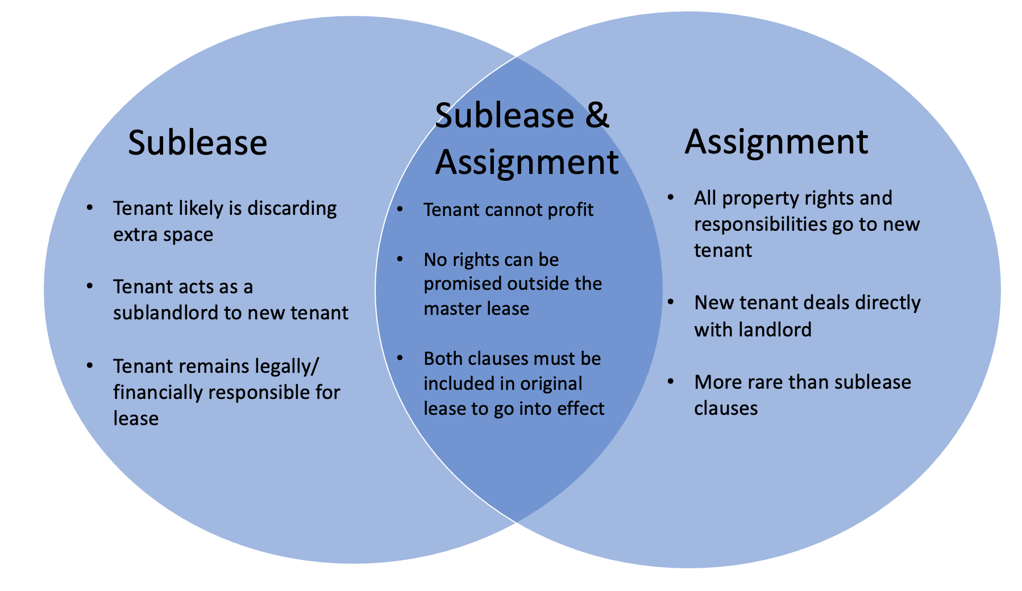Business is unpredictable. To protect yourself as a corporate tenant, your real estate should allow for flexibility. So whether you are looking to outline your rights in a new lease, discard extra space, or want to learn about your best option to get out of an existing lease, this article is for you.
As tenant reps, we have seen how critical sublease and assignment clauses are to the interests of our corporate clients. If improperly negotiated or omitted from your lease, your company could suffer extreme budgetary and financial complications.
To avoid this possibility, we have included our three decades of market knowledge in this article so you can properly understand these two commonly misconstrued clauses. In the process, you will be able to identify which one may be right for your situation and will best protect your interests and budget.
- What are the basics of the assignment clause?
- What are the basics of the sublease clause?
- What do assignment and sublease clauses have in common?
The Assignment Clause
In the event of a lease assignment, the original tenant relinquishes all the rights they held in the leasehold estate, transferring them to a new tenant. This means that they can no longer access the premises, and all stipulations of the original lease fall on the new party.

The original tenant is no longer legally or financially bound by their lease. Instead, the new tenant takes over all obligations and deals with the landlord directly.
The assignment clause does not give new tenants the freedom to negotiate for lower rent, new features, or less space. Rather, they simply adopt the master lease as their own for the remainder of the term.

When Would Assignments Take Place?
Assignment clauses are rarely observed. Think about it from the landlord’s perspective. They already have a party on the hook with a binding legal and financial document. Often, it is not within their interest to pass along this obligation to a new tenant. However, when assignment clauses do go into action, it is likely due to the following reasons:
- The landlord would prefer to work directly with the new tenant
- The landlord won't permit the cancellation of a lease and is willing to work with new tenant
- The original tenant sells their business, and the buyer adopts their commercial real estate
There are multiple reasons why the landlord would rather work directly with the new tenant. For example, if the landlord and the original tenant have an adverse relationship, the former may wish to cut out the original tenant as the middleman.
More commonly, the landlord will wish to work directly with the new tenant if they have a substantially higher credit rating than the original tenant. In some cases, this could turn into a direct deal rather than an assignment.

Assignment clauses will usually take place, though, when a new party assumes the assets of the original tenant. For example, if they go bankrupt or are bought out, the new tenant will assume the property rights of their commercial real estate.
The Sublease Clause
When a corporate tenant puts their sublease clause into action, it is likely because their organization’s spatial needs have changed. Sublease clauses are often observed when the tenant has more space than needed for their employees. Properly executing a sublet will allow the tenant to mitigate the wasted space’s drain on their budget.
|
If you think you could benefit from subleasing, you should measure your space utilization and compare it against your optimal square footage. |
Then, if you find that you have extra space, you could make back some of the funds lost to under-utilized square footage.
Why is Subleasing so Important Now?
Commercial subleasing is especially pertinent following the COVID-19 epidemic. Many businesses transformed their operations to at-home or hybrid models. As a result, offices were left empty or underpopulated.

To make back some of these expensive rental payments, many listed portions or their entire leased space for under-market value.
The original tenant will forge a new agreement with the subtenant when subleasing. The original tenant becomes the sublandlord and acts as a medium between the subtenant and the landlord. The subtenant does not have a relationship with the landlord.
How Does Subleasing Work?
Since the sublandlord acts as a middle man, they are responsible for any missing rent payments from the subtenant and are the party to deal with landlord defaults. The original tenant will likely transfer some or all of their premises but maintains all legal rights (and consequences) of the property. This is one of the most significant differentiating points of the sublease from the assignment clause.
|
The master lease will probably have a stipulation that forbids the tenant from earning extra income from the subtenant. |
The original tenant likely cannot profit from subleasing. The rent rate the subtenant is charged will be dependent on many factors.
- The remaining length of the lease term
- Supply and demand of the current market
- The desperation of the original tenant to discard space
- The creditworthiness of the subtenant.
As such, the subtenant has the power to negotiate the price and terms of their agreement with the sublandlord. This is unique to subleasing. It also makes it a desirable option for tenants looking for shorter periods than landlords would agree to, a space mostly prepared for occupancy, and cheap rent. Often subleased space is listed for 10-50 cents on the dollar compared to other Class A properties on the market.
Subleases & Assignments
The sublease and assignment clauses both relieve the original tenant (to some extent) of the burden of a property that no longer fits their needs. Wasted space is expensive, and these clauses mitigate its effects. They are crucial to lightening the responsibilities of the original lease without breaking it, which carries severe financial and legal consequences.

The Clauses Must Already Be Laid Out
However, it is to be noted that the sublease and assignment clauses cannot go into effect without being specified in the original lease. This means that when you are negotiating a new corporate lease, it should be of paramount concern to get these clauses outlined. If not, you could find yourself victim to unforeseen circumstances that change your spatial needs without anything to do about it.
If you attempt to exercise these clauses without them priorly specified in your lease, you are likely violating the agreement which may hold the same ramifications as breaking your lease.
Even if these clauses are laid out in your lease, you will require landlord approval before they can go into effect. Since you are occupying the landlord’s property, this is known as reasonable consent.

There are No Rights Outside of the Master Lease
You also cannot promise rights outside of what was specified in the master lease. The subtenant (new tenant) will be held to the same stipulations that you were. Any clauses or perks outside the original lease cannot be included in future documents.
Similarly, with both these clauses, the original tenant (almost assuredly) cannot profit. Landlords want to dissuade their tenants from the business of renting space and, as such, will require stipulations that forbid listing rent for rates higher than the original tenant pays.
These clauses benefit both new and old tenants. Existing tenants can either partially make back funds lost to wasted space or get out of a lease that no longer suits them. New tenants can find shorter-term leases than what a landlord would normally want to sign. The spaces will likely be move-in ready and cheaper than comparable market rent rates.

How a Tenant Rep Can Help Your Sublease and Assignment Clauses
These clauses are critical to a lease that benefits the tenant. They allow the corporate tenant to adapt to changing internal demands and unforeseen external circumstances flexibly. Failure to properly outline these clauses could lead to extreme financial losses and legal ramifications. Why would you want any room for mistakes? There's more than meets the eye with these clauses. They can be either simple or complex. The important thing to remember is that working with a real estate expert will minimize any chance of errors. Seeking out expert advice from not only a competent attorney, but a tenant rep as well, will lead to the most successful real estate outcomes.
Tenant reps are experts in lease negotiation and work on the tenants' behalf. By spending over three decades protecting tenants’ interests, we know how to ensure that our corporate clients receive the lease that is most advantageous to them. We have worked extensively with both sublease and assignment clauses. We can walk you through these critical lease aspects to forge a document that works for you.
Check out this article to learn more about why you shouldn’t negotiate without a rep!







